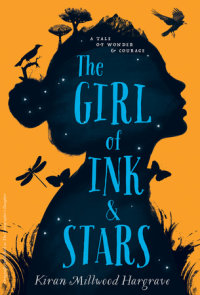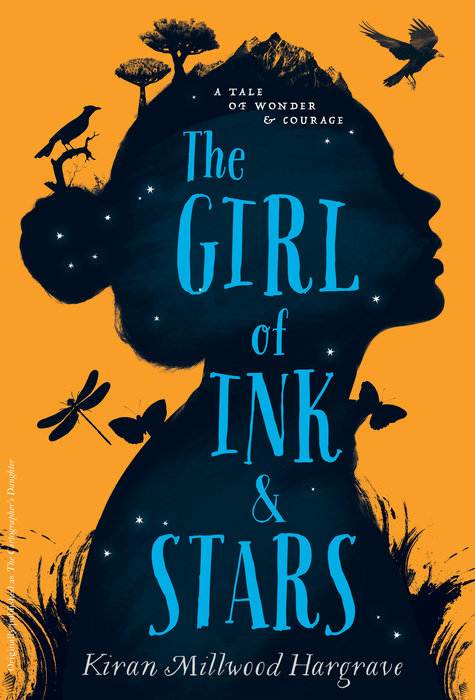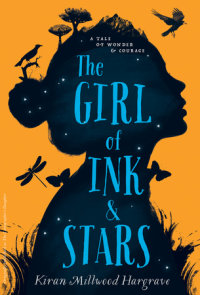The Girl of Ink & Stars
A beautifully written story of friendship, discovery, myths, and magic that the London Times called "reminiscent of fantasy greats such as Philip Pullman and Neil Gaiman."
Legends say that the island of Joya was once a place where songbirds sang in every tree and the islanders were free to come and go as they pleased. That was before the harsh-ruling Governor arrived, and ravens drove out the native birds. Now there are no songbirds, and the people are forbidden to travel beyond the forest that separates them from the rest of the island.
But for Isabella, the legends of her island home have always seemed like more than just stories. And when a series of mysterious events shakes the community, it’s Isabella—daughter to the island’s only mapmaker—who will lead a party of explorers into the forest in search of answers. As the group ventures deeper and deeper into the island, dark secrets begin to surface, and the legends Isabella has listened to all these years show signs of coming to life.
Debut novelist Kiran Millwood Hargrave draws on the cultural folklore of the Canary Islands in this richly told story of a girl’s quest to map her own place in a world that legends alone have shaped.
Advance Praise:
"[R]eminiscent of fantasy greats such as Philip Pullman and Neil Gaiman." --The London Times
An Excerpt fromThe Girl of Ink & Stars
1
They say the day the Governor arrived, the ravens did too. All the smaller birds flew backward into the sea, and that is why there are no songbirds on Joya. Only huge, ragged ravens. I’d watch them perch on the rooftops like omens, and try to squint them into the chaffinches and goldcrests Da drew from memory. If I imagined hard enough, I could almost hear them singing.
“Why did the songbirds leave, Da?” I’d ask.
“Because they could, Isabella.”
“And the wolves? The deer?”
Da’s face would darken. “Seems the sea was better than what they were running from.”
Da would tell me another story then, about the girl-warrior Arinta, or Joya’s mythical past as a floating island, and refuse to say more about the wolves and the backward birds. But I kept asking, until the day came when I found my own answers.
The morning it began was like any other.
I woke in my narrow bed, sunrise just starting to brighten the mud walls of my room. The smell of burnt porridge hung on the air. Da must have been up for hours, as it took a long time for the fire to heat the heavy clay pot. I could hear Miss La, our hen, scratching about outside my room, seeking out crumbs. She was twelve years old, same as me, but even though it’s young for a person, it’s very, very old for a chicken. Her feathers were gray, her mood was black, and even our cat, Pep, was scared of her.
My tummy rumbled as I stretched out my arms. Pep was sprawled across my legs, and he yowled loudly as I sat up.
“You awake, Isabella?” Da called from the kitchen.
“Morning, Da.”
“Porridge is ready. A little overready, in fact . . .”
“Coming!” I eased my legs out and smoothed the cat’s rough fur where it had ruffled in the night. “Sorry, Pep.”
He purred and closed his green eyes.
I washed my face in the basin by the window and stuck a tongue out at the reflection in the polished metal above Gabo’s bed. I straightened his sheets, dustier every day but still made, and traced the voice line arched next to his pillow--a long, thin hollow Da had etched for us up the walls and over the ceiling. When we pressed our lips to it and whispered, it carried our voices so we could talk even when we were at each end of the room in our separate beds.
Three years now. Three years since I sat there, my twin’s hand fire in mine as he faded in the night, fast as a blown-out match.
But still I could conjure him. Easy as breathing.
It would not do to start the day sad. Shaking the thoughts out of my head, I pulled on my school dress instead. It was as big as it had been six weeks before. My best friend, Lupe, would laugh. Still the shortest in the class! she’d say.
I quickly braided my unbrushed hair and hoped Da wouldn’t notice I hadn’t untangled it all summer. Pep was rolling on the bed, but I wasn’t allowed to stroke him with my uniform on. My teacher, Señora Feliz, was always picking ginger hairs off my dress with irritated fingers.
I pulled aside the curtain that served as my bedroom door and carefully stepped over Miss La, who squawked as I scattered her small pile of crumbs. She narrowed her misty eyes and pecked at my ankles, chasing me farther into the main room, where we ate, talked, and planned adventures.
A big bowl of blackened porridge sat on our large pine-plank table, marooned among a sea of maps. More of Da’s maps were stuck to the walls, and they rustled as I passed, like a talking breeze.
I traced the papers with my finger, as I did every morning, watching how the silver pigment of Afrik’s rivers met those of Æygpt, how Æygpt clung to the curve of Europa Bay like one hand grasping another across the sea. On the opposite wall hung the sketchy coast of Amrica and its dragging ocean currents, labeled with strange, wondrous names: the Frozen Circle, the Vanishing Triangle, the Cerulean Sea. The paper was dyed a beautiful deep blue, and the currents were picked out in thread against it. Da had used a needle and thread thin as a hair for these: gold for Cerulean, black for the Triangle, white for the Frozen Circle. But past the eastern coast, everything stopped. Only one word broke the blankness:
Incognito. Unknown.
I could almost feel Da’s disappointment in the long-dried ink of the word. Unfavorable tides on his last trip had meant an early return to Joya, and Da never again made it across that wild expanse before the Governor arrived on our island. Governor Adori closed the ports and made the forest that stretched coast to coast between our village of Gromera and the rest of the island into a border, banishing anyone who resisted his rule to the other side. Gromera was cut off from the rest of Joya, and the forest was strung with thick thorns and enormous bells to warn the Governor’s guards if anyone came through. I had never heard the bells ring.
I knew Da dreamt of filling in the gaps on his Amrica maps, whereas what I wanted, more than anything else, was to cross the forest border and chart the Forgotten Territories, which lay beyond, though I had never told him so.
There was only one map that showed the whole of our island, and it hung in Da’s study. I called it Ma’s map because it had been passed down through her family for generations, maybe even as far back as Arinta’s time a thousand years ago. It had always felt like a sign that Ma and Da were meant for each other, that he was a cartographer and her only heirloom was a map.
Each of us carries the map of our lives on our skin, in the way we walk, even the way we grow, Da would often say. See here how my blood runs not blue at my wrist, but black? Your mother always said it was ink. I am a cartographer through to my heart.
“Fetch the jug, would you?” Da’s voice made me jump, pulling me back into the room.
I dragged a chair to the shelves, carefully taking the jug from high up, and put it on the table next to the porridge. It was forest green and special because it was the last thing Ma had made. We used it only on the first and last days of school, or birthdays and feast days. Da kept it out of reach and washed it with great care.
I could remember Ma sometimes--dark-eyed and mostly smiling, smelling of the black clay she worked with, making pots for the villagers and delicate pieces for the Governor. Or maybe I imagined her, like the songbirds.
“Good morning, little one.” Da limped from the kitchen. I rushed to take the milk pail and cups he was carrying.
“You shouldn’t walk without your stick,” I scolded.
Da had broken his leg as a young man, leaping from the jetty of an Æygptian port onto a moving ship that was leaving for Amrica without him, and now used a walking stick carved from a fragment of his great-grandfather’s fishing boat. It was my favorite thing out of the many favorite things in the room. Light as paper, it floated in even the thinnest skim of water, but most miraculous of all, it glowed in the dark. Da said it was because of the sap, but I knew it was magic.
I hurried to clear a space on the table, shifting the Himalay Mountains onto a shelf.
Da poured the milk into Ma’s jug, then settled down on the bench next to me and grinned. “Pick a pocket.”
I rolled my eyes. “Left.”
He wiggled his eyebrows like two black caterpillars. “Right answer.” He pulled a small jar from his pocket.
“Pine honey!” I unscrewed the lid, and the smell filled my nostrils, making my mouth water. “Thank you, Da.”
“Nothing but the best for your first day back at school.”
I shrugged. “It’s only school. . . .”
“Oh, well, I suppose I’ll just have to eat all of this myself, then. . . .” He took the open jar and mimed pouring the honey into his mouth.
“No!” I grabbed it back. “You’re right, it’s a very important day. I’m only surprised you didn’t get two jars.”
The honey was so good I hardly noticed the porridge was burnt, but when I looked up, Da’s food was untouched. He was sitting in that hunched way that meant he was thinking. His hand rested on the milk jug, and I could see the pulse in his wrist. His eyes had a faraway look.
First days of school were hard for both of us.
I cleared away my bowl as quietly as I could and pushed his closer to his hand. “I’ll see you later, Da.”
When he didn’t answer, I picked up my satchel and left the house, closing the peeling green door gently behind me.
2
Our street ran in a straight, steep line down to the Western Sea, and all the houses were built the same, a long row of mud huts with straw roofs that Lupe thought looked sweet. I thought that they looked as if one good gust of wind would send them all tumbling into the sea.
I normally ran to the market square, skidding downhill on my heels, because the ravens liked to fly low and running put them off. Today, though, I settled into a fast walk--after all, I was almost at the top of the school now. It didn’t seem right to run like a little child.
Masha, who lived across the street, was standing in her doorway. I waved, trying to see past her into the house.
“Looking for someone?” She smiled, her lined face crinkling like old paper. “Pablo’s already left. You know the Governor likes them to be at work before dawn.”
Masha’s son, Pablo, had been born when she was already old, her belly swelling even as her hair turned gray and her face creased with age. Masha had called it a miracle, and Pablo was miraculous. Gabo and I had always been in awe of him, as all the villagers were, because of his strength. At age ten, he could lift his parents, one over each shoulder. Having a piggyback from Pablo felt like flying, but it had been a long time since I’d seen him.
Two years ago, when his mother’s back got too bad, Pablo left school and took her place as a laborer, although Masha pleaded with him not to. Now fourteen, he pulled carts as if they were paper, and cared for the Governor’s horses too.
“He took the present for Lupe,” Masha added, wrinkling her nose. I knew she didn’t understand why I chose to be friends with the Governor’s daughter. “I told him to hide it like you asked.”
“Thank you,” I said. “Maybe I’ll see him tomorrow?”
“Maybe.” But her voice was not hopeful. He was always up before sunrise, home after dark.
I waved good-bye, shouldered my satchel, and started down the hill.
From this high up, Gromera looked like a wheel, or a starburst, with the market square at its center and streets like spokes spiking outward, some ending at the wide, calm harbor that bottlenecked into the sea, ripe with fish. On a clear night, the stars settled on its surface like water lilies.
The Governor’s ship was moored there, as always. Da said it was carved from a single Afrik baobab trunk. The baobab must be an enormous tree because the hull nearly spanned the width of the port, the mast arrowing toward the sky, the sails stowed. It crouched over the fishing fleet like a mountain, huge and unmoving. Like everything the Governor had, it took up far more space than it ought to.
To the east, his house glinted in the sunrise. Built from black basalt and big as five ships, the mansion sat between the blue sea and the green forest, spreading out over the fields like a storm cloud. From here, though, it looked small enough to squash between my forefinger and thumb. Below it was the village, with the school halfway between.
The old school building had been small but bright, and we had painted the walls rainbow colors with whatever dyes Da could spare. But then the Governor had knocked it down--Lupe had decided she’d had enough of being taught alone at home and demanded to be sent to the local school like the rest of us.
Governor Adori had rebuilt it from stone, twice as big, because if his daughter was going, it had to look grander.
“Not for me, you understand,” said Lupe with a sad smile. She adopted an even posher voice to add, “To uphold the family honor.”
We weren’t allowed to paint the walls of the new school. A lot of children were unkind to Lupe because of that, but I knew it wasn’t her fault.
Behind the Governor’s house, closest to the forest, were the orchards, where I had never been. I squinted at the antlike specks of the laborers there and wondered which one was Pablo. To the west, the black sand of the beaches was almost covered by the incoming tide. We were not permitted to be on the beaches at high tide, and no one was allowed in the sea unless they were launching one of the Governor’s boats. My toes itched. Da had described being in the sea, but it was not the same as trying it for myself.
Above the beaches were the clay mines, which I tried not to look at because it brought back one of the few clear memories I had of Ma--the day she took Gabo and me to the mines. She taught us how to tie ourselves with vines to a dragon tree--You knot like this, and then rub the sap into your hands for grip--and lowered us one by one into the gorge. Gabo got scared and wriggled so much the knot broke. When he landed on the soft mud at the bottom, it made a very rude noise, and he was filthy when Ma climbed up with him from the darkness.
I laughed so hard it hurt.
I remembered that, that ache in my belly. How it came back two months later, when Ma died. Only then it was sharper, and there was no one carrying anyone out of that darkness. Three years later, the same sweating sickness took Gabo. Three years after that, the clay mine memory still made my throat feel tight.


